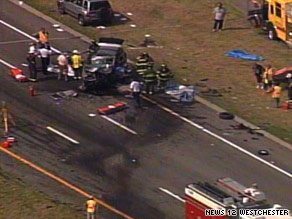Sunday, July 26, 2009
Corellian Death Rays and Trauma Involving Children
 Eight people were killed in a three car accident about 20 miles North of New York City today. Unless you know the people involved, you probably read that and were not particularly affected by it. But it's all in the description. Do you feel differently about this one? Four children, as well as four adults, were killed in a three car accident in New York State today.
Eight people were killed in a three car accident about 20 miles North of New York City today. Unless you know the people involved, you probably read that and were not particularly affected by it. But it's all in the description. Do you feel differently about this one? Four children, as well as four adults, were killed in a three car accident in New York State today.Conventional wisdom tells us that traumatic incidents involving children are harder than those that only involve adults. We all know that instinctively, but why is it true? It all comes down to the ever-present worldview. Most of us hold a set of beliefs on a gut level that are something like these:
- Children do not die
- Parents do not outlive children
- Bad things do not happen to good people
- Children are inherently good
- Parents have the obligation to keep children safe, and we can accomplish that goal
- Short lives are a waste
But with the possible exception of "children are inherently good" (and we can argue about whether short lives are a waste -- I really do not believe they are), none of these things are actually true. And in fact we know they are not true. So why are they so important to us that we lead our lives relying on them being true?
I find myself reminded of the scene in the movie Men in Black where Tommy Lee Jones' character says,
There's always an alien battle cruiser, or a Corellian death ray, or an intergalactic plague intended to wipe out life on this miserable little planet. The only way these people can get on with their happy lives is that they do not know about it!In other words, as you've heard me say before, we base our lives off of what is likely, not what is possible. We choose to ignore what we know to be true -- that tragedy is possible -- because if we lived in the shadow of tragedy all the time we would not be able to live at all. We choose not to know what we know. Until we read headlines like the one today, and we remember.
Subscribe to:
Post Comments (Atom)
Meet the Quarterback

- Naomi Zikmund-Fisher
- is a clinical social worker, former school Principal and a Crisis Consultant for schools and community organizations. You can learn more about her at www.SchoolCrisisConsultant.com
Contact the Quarterback
Monday Morning Crisis Quarterback on Facebook
Subscribe via email
Quarterback for Kindle
Blog Archive
-
▼
2009
(185)
-
▼
July
(24)
- The Texas Fertilizer Fire
- Vaccine Priorities are Out
- Trauma Witness and Witness for the Prosecution
- The Ethics of Flu and the Trauma of Ethics
- Corellian Death Rays and Trauma Involving Children
- The Culture of Different Professions
- Critical Incident, or Just a Crisis?
- The Line of Duty
- Getting it Right the Second Time
- Harry Potter and the Half Blood Prince: A Picture...
- And That's the Way it Is: Walter Cronkite (1916-2...
- Why Us?: The Jakarta Hotel Bombings
- Put On Your Own Mask First
- You Can't Contain the Facts: The Murder of August...
- The Pros and Cons of a Military Smoking Ban
- The Other Survivors of Train Accidents
- Flu Preparedness: Body AND Mind
- Steve McNair, Sahel Kazemi, and the Woulda Shoulda...
- The Intersection of Crisis Response and . . . Pret...
- Trigger: It's Not Just for Roy Rogers Anymore
- Anger and Trauma: Two Great Tastes that Taste Gre...
- The (Un) Happiest Place on Earth
- All Men are Created Equal
- Why We Love Bahia Bakari, But Not Enough to Know H...
-
▼
July
(24)



2 comments:
You mean, using that river in Egypt is actually important to our sanity?
I actually would argue that this isn't denial. Denial is if I ask you if it is possible that your children could ever be killed in a car accident and you tell me that no, it is not possible. This is more selective attention. You know it is possible -- you don't deny it -- but it doesn't rule your life.
Post a Comment